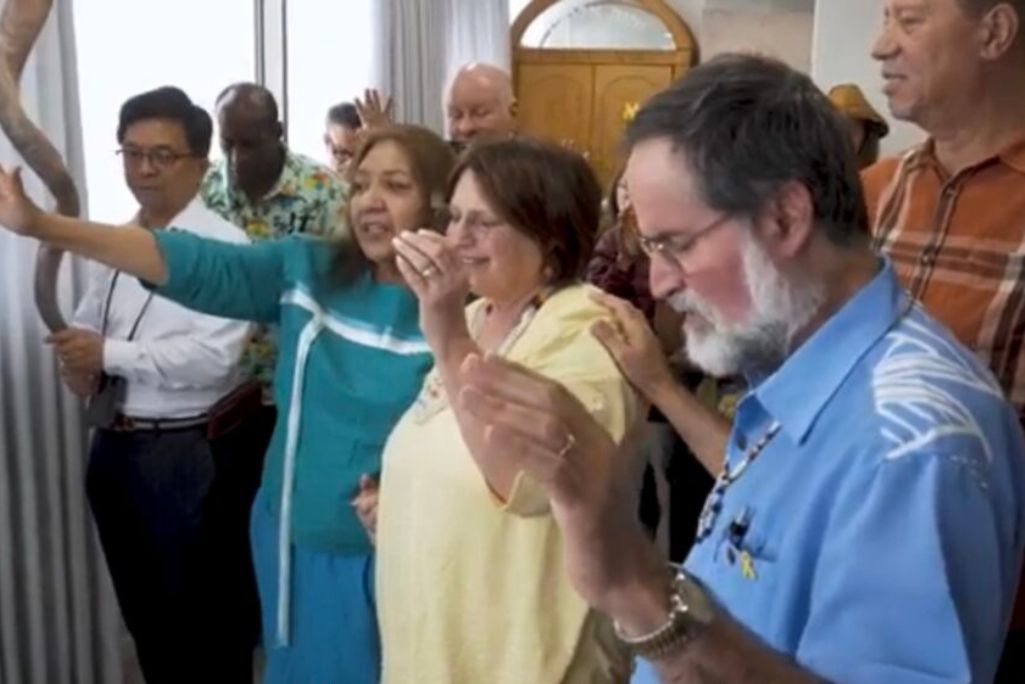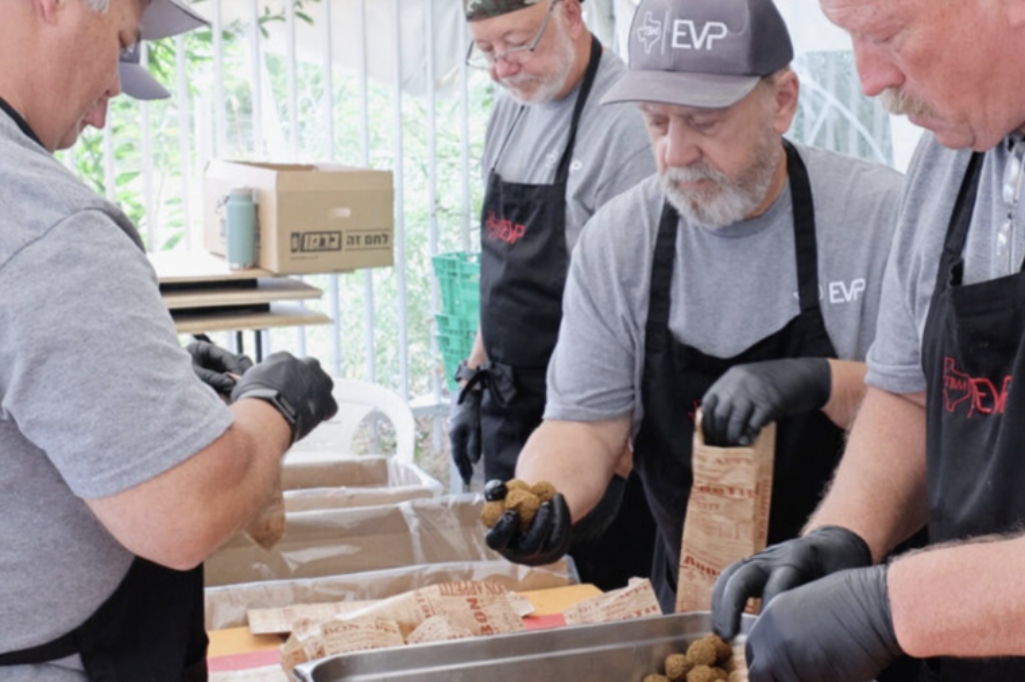
Adonai Roi Congregation Founding Pastor Avi Mizrachi, front row right, and his wife Chaya at his side, worship with the congregation in Tel Aviv.
TEL AVIV, Israel (BP) — D’vora was rushing her two children to the home of her father Avi Mizrachi, founding pastor of Adonai Roi Congregation in Tel Aviv, when overhead missiles from Iran forced her to seek cover.
She had hoped to secure her 5-year-old daughter Hadas and 2-year-old son Noam in her father’s bomb shelter before she responded to a call for search and rescue volunteers.
“And when the missiles started falling, my children and I were not in a safe room. We were outside in the open road with no shelter to protect us. So I literally had to put my kids on the ground and use my body as a human shield over them,” D’vora, a former Israeli soldier, told Baptist Press. “And the shrapnel fell all around us. It fell so close that from the impact we flew and my daughter was slightly injured.
“But we, by a miracle, we were saved and we lived. And we were able by the end to find a better place of shelter. And I’m alive today to tell you the story.”
That was Oct. 1, 2024, nearly a year into the Israeli-Hamas War. Six months later, the conflict with Iran would escalate into the 12-day Iran-Israel war that ended June 24 in a ceasefire seen as tenuous. During the brief war, at least 28 Israelis died, including 27 civilians, and 3,000 were injured, Israeli health and ministry officials announced.
Israel was already in despair from the October 2023 Hamas attack that launched the Israel-Hamas War. But it is amid that despair that Mizrachi has found open doors to spread the gospel to Jews in Israel, he told Baptist Press days after the Iran-Israeli ceasefire.
“We were in shock. And it really shook us. It really shook the nation of Israel,” he said of the 2023 Hamas attack, which he described as particularly shocking because it was well planned and seemed to take Israeli military officials by surprise. “And people started really seeking.”
Mizrachi broadcasts gospel messages in Hebrew on Shelanu TV through Dugit Outreach Ministries, which he founded with his wife Chaya. Each broadcast offers free copies of the New Testament in Hebrew. Before the war, they’d get one request a week, Mizrachi said, but requests have increased. Dugit is so named from the Hebrew word for a small fishing boat.
“Every week, we go to the post office and mail New Testaments to people that requested it through social media, because they heard through the social media the simple messages, ‘There is hope in the Messiah. Would you like to know? And are you interested that God has a plan for your life?’” Mizrachi said. “In the midst of all the turmoil, people’s hearts have really opened to the gospel more than ever, and I believe this is the time that God the Holy Spirit is removing the veil from the Jewish people’s eyes and they see Him as their Jewish Messiah, as their Savior.”
D’vora, who completes her name with the initials M.B. for security purposes, directs Dugit ministries and aided her father in researching his book, “Legacy of Hope: Hidden Heroes from Generation to Generation,” that the two said has also aided in spreading the gospel during wartime.
“Legacy of Hope shares the remarkable history of Bulgaria’s Jews who were saved from Nazi concentration camps because of an Orthodox priest and a rabbi who came to believe in Jesus as the Messiah,” D’vora said. “But it also includes the story of my family, and how my grandmother and grandfather, who were Bulgarian Jews protected during the war, came to believe in Jesus as the Messiah.
“So this important book of history, telling a Holocaust story many people do not know, is opening doors for people to hear the gospel.”
She and her father believe the importance of prayer is often understated and want to spread the story that prayer saved the lives of Bulgarian Jews during the Holocaust.
Today, Mizrachi counts it a miracle that the more than 500 missiles Iran dropped on Israel in the 12 days of war not only didn’t exact more damage, but also that Israeli homes are required to be built with bomb shelters.
“Those are huge missiles. I’m talking like the size of a big bus. Can you imagine a big, huge bus full of dynamite that is shot into the air, into the atmosphere, and then comes down?” he asks. “And when it comes down, when it explodes, the whole neighborhood, the whole block of houses, is destroyed. And many people die. So we have been facing this every night. And also early in the mornings for the last 12 days. And we’ve had, it’s a total miracle of God, we’ve had only 28 people killed.”
Churches were not able to meet in person during the 12-day war — and at many times during the ongoing war with Hamas — but continued ministry online. Adonai Roi Congregation has ministered by reaching out to communities impacted by the bombing, providing humanitarian aid, prayer and gospel hope, using Old Testament Scripture to enter gospel conversations.
Neither Adonai Roi nor other Messianic congregations were damaged in the latest bombing, Mizrachi said, although Adonai Roi rents a meeting place.
Only a handful of Christians lived in all of Israel when the nation reclaimed statehood in 1948, Mizrachi estimates. But he counts more than 20,000 believers there today including Jews from various countries.
“I’m talking believers from Jewish background, Israeli. We have also Arab, Israeli believers, born-again believers,” he said. “We have also Russian-speaking immigrants that immigrated from Russia and from Ethiopia, and they have their congregations. And we call ourselves Messianic Jews. We are Jewish believers and we lead congregations. And there are more than 500 congregations all over the land of Israel. They may speak Hebrew, they may speak Arabic, they may speak Russian, or Amharic, Ethiopian. We have a couple in English. But what’s exciting is to see that there’s local congregations all over the land of Israel, almost in every city, because God is working.”
While the Israeli government has laws against evangelism, or “proselytizing” as it is called — and Orthodox rabbis sometimes try to enforce those laws — Mizrachi said he has been able to work within the law to spread the gospel.
“So we share the good news and we share with them as Jews that we have found a Messiah and we have found new life in the Messiah. And they will be a better Jew by knowing the Messiah, the Savior, Yeshua. And people respond,” he said. “And we have some of the Orthodox rabbis that are very angry with us. And they will do sometimes demonstrations. Sometimes they will try to persecute us.”
D’vora, who is working on a documentary based on Legend of Hope to debut at the 2025 Israeli Film Festival, believes the prayers of Christians are sustaining Israel. She encourages Southern Baptists to continue to pray for Israel, describing the current times as the most tragic she has seen in her lifetime.
“I was a soldier myself. So I’ve been through hardships. I’ve been through battles. But nothing has prepared me for what we’ve been facing these last months,” she said. “And it’s really, really the time of Jacob’s troubles. There’s been one thing after the other.
“And my encouragement is that the Christians continue to pray for us, because that is not a small thing. Your prayers are what’s saving our lives.”
(EDITOR’S NOTE — Diana Chandler is Baptist Press’ senior writer.)


